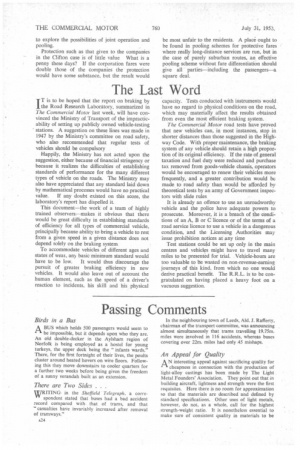The Last Word
Page 26

If you've noticed an error in this article please click here to report it so we can fix it.
IT is to be hoped that the report on braking by the Road Research Laboratory, summarized in The Commercial Motor last week, will have convinced the Ministry of Transport of the impracticability of setting up publicly owned vehicle-testing stations. A suggestion on these lines was made in 1947 by the Ministry's committee on road safety, who also recommended that regular tests of vehicles should be compulsory Happily, the Ministry has not acted upon the suggestion, either because of financial stringency or because it realizes the difficulties of establishing standards of performance for the many different types of vehicle on the roads. The Ministry may also have appreciated that any standard laid down by mathematical processes would have no practical value. If any doubt existed on this score, the laboratory's report has dispelled it.
This document—the work of a team of highly trained observers—makes it obvious that there would be great difficulty in establishing standards of efficiency for all types of commercial vehicle, principally because ability to bring a vehicle to rest from a given speed in a given distance does not depend solely on the braking system To accommodate vehicles of different ages and states of weal, any basic minimum standard would have to be low. It would thus discourage the pursuit of greatet braking efficiency in new vehicles. It would also leave out of account the human element, such as the speed of a driver's reaction to incidents, his skill and his physical capacity. Tests conducted with instruments would have no regard to physical conditions on the road, which may materially affect the results obtained from even the most efficient braking system.
The Commercial Motor road tests have proved that new vehicles can, in most instances, stop in shorter distances than those suggested in the Highway Code. With proper maintenance, the braking system of any vehicle should retain a high proportion of its original efficiency. If the rate of general taxation and fuel duty were reduced and purchase tax removed from goods-vehicle chassis, operators would be encouraged to renew their vehicles more frequently, and a greater contribution would be made to road safety than would be afforded by theoretical tests by an army of Government inspectors with slide rules It is already an offence to use an unroadworthy vehicle and the police have adequate powers to prosecute. Moreover, it is a breach of the conditions of an A, B or C licence or of the terms of a road service licence to use a vehicle in a dangerous condition, and the Licensing Authorities may issue prohibition notices at any time Test stations could be set up only in the main centres and vehicles might have to travel many miles to be presented for trial. Vehicle-hours are too valuable to be wasted on non-revenue-earning journeys of this kind, from which no one would derive practical benefit. The R.R.L. is to be congratulated on having placed a heavy foot on a vacuous suggestion.




















































































